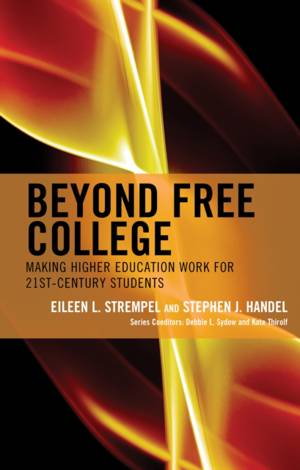
- Afhalen na 1 uur in een winkel met voorraad
- Gratis thuislevering in België vanaf € 30
- Ruim aanbod met 7 miljoen producten
- Afhalen na 1 uur in een winkel met voorraad
- Gratis thuislevering in België vanaf € 30
- Ruim aanbod met 7 miljoen producten
Zoeken
Beyond Free College
Making Higher Education Work for 21st Century Students
Eileen L Strempel, Stephen J Handel
€ 135,95
+ 271 punten
Uitvoering
Omschrijving
Beyond Free College outlines an audacious national agenda--consistent with, but far more comprehensive than, the current "free college" movement--that builds on the best of US higher education's populist history such as the G.I. Bill and the community college transfer function. The authors align a wide constellation of higher education trends--online learning, prior learning assessment, competency-based learning, high school college-credit-- with a rapidly shifting student transfer environment that privileges college credit as the pivotal educational catalyst to boost access and completion. The book's agenda seeks greater productive investment in postsecondary education by privileging a single metric--lower-cost-per-degree-granted--as the animating driver of a transfer pathway that will fulfill the potential of its historical, progressive innovators. Beyond Free College's goal is as simple as it is urgent: To galvanize higher education advocates in an effort to reorganize, reorient, and reignite the transfer function to serve the needs of a neotraditional student population that now constitutes the majority of college-goers in America; and in ways that advance completion, not just access to higher education.
Specificaties
Betrokkenen
- Auteur(s):
- Uitgeverij:
Inhoud
- Aantal bladzijden:
- 182
- Taal:
- Engels
- Reeks:
Eigenschappen
- Productcode (EAN):
- 9781475848649
- Verschijningsdatum:
- 5/02/2021
- Uitvoering:
- Hardcover
- Formaat:
- Genaaid
- Afmetingen:
- 152 mm x 229 mm
- Gewicht:
- 439 g

Alleen bij Standaard Boekhandel
+ 271 punten op je klantenkaart van Standaard Boekhandel
Beoordelingen
We publiceren alleen reviews die voldoen aan de voorwaarden voor reviews. Bekijk onze voorwaarden voor reviews.







